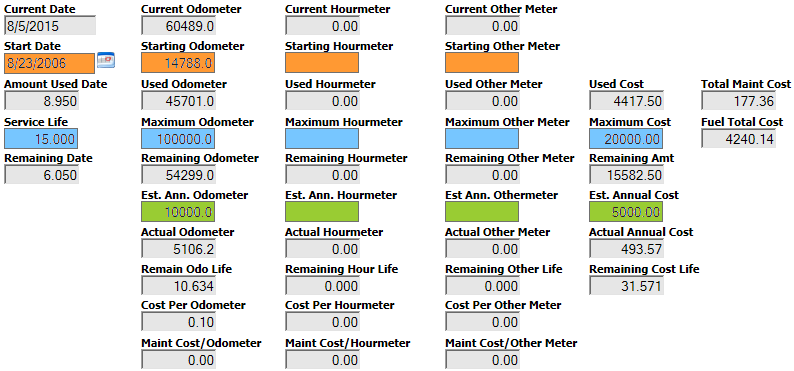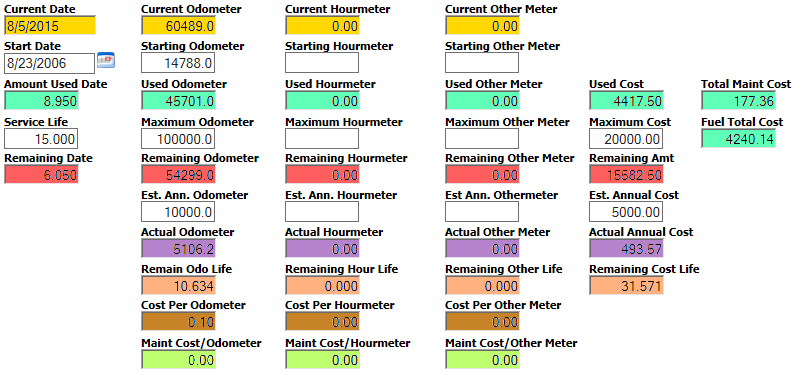Evaluation Fields
The Fleet module's evaluation (eval) fields help agencies estimate the running cost of a vehicle. These fields can also be used to assess a vehicle's life span, based on running costs and recorded usage.
Users supply the data for certain evaluation fields (in color below, but appear in white in the module), while other fields are calculated automatically by the system (grayed out below and in the module).
User-Populated Fields
The fields highlighted in color in the screenshot below must to be populated by the user before the system can calculate values for other fields.

The following fields, highlighted in orange above, record information about the status of the vehicle when it was put into service.
|
Start Date |
The date the vehicle entered into service. |
|
Starting Odometer Starting Hourmeter Starting Other Meter |
The meter reading when the vehicle entered into service. |
The fields highlighted in blue above store data about the life-expectancy of the vehicle.
|
Service Life |
The number of years the vehicle is expected to be in service. |
|
Maximum Odometer Maximum Hourmeter Maximum Other Meter |
The anticipated maximum meter reading for the vehicle. |
|
Maximum Cost |
The maximum amount of money available to spend on vehicle repairs and preventative maintenance during the vehicle's life span. |
The fields highlighted in green predict the estimated annual usage of the vehicle.
|
Est. Ann. Odometer Est. Ann. Hourmeter Est. Ann. Other Meter |
The estimated annual meter reading for the vehicle. |
|
Est. Annual Cost |
The estimated annual expenses for the vehicle. |
Calculated Fields
Once a user supplies the pertinent data and the record is saved, the system automatically calculates values for the remaining fields, which relate to the current state of the vehicle. These system-calculated fields are highlighted in color in the screenshot below.

The data that the system uses to calculate these fields come from Fleet Fueling, Inspection, Work Order, Travel Log, and Reset records for the vehicle. When the system detects that such a record has been created (that is, the record has a more recent date and higher meter reading), Lucity updates the system-calculated fields.
Lucity updates these values each night, as well as when a user saves or refreshes the Fleet record.
|
Current Amounts |
|
|---|---|
|
Current Date |
The last date that any Work or a Fueling, Travel Log, or Reset was recorded for the vehicle. |
|
Most Current Time |
The last time that any Work or a Fueling, Travel Log, or Reset was recorded on the date above. This field allows multiple records of the previously listed types to occur on the same day. |
|
Current Odometer Current Hourmeter Current Other Meter |
The most recent meter reading, the source of which may be a Fueling, Inspection, Travel Log, Work Order, or Reset record. a Fleet vehicle is used on a Fleet Reservation where Actual Return Date/Time > Fleet Inventory Eval Current Date/Time, update Fleet Inventory's Eval Current Date/Time and Current Odometer fields with Fleet Reservation's Actual Return Date/Time and Return Mileage |
|
Vehicle Usage |
|
|
Amount Used Date |
The number of years the vehicle has been in service. Calculated as: Current Date - Start Date. |
|
Used Odometer Used Hourmeter Used Other Meter |
The number of miles the vehicle has been used since being put into service. Calculated as: Current Odometer - Starting Odometer. |
|
Used Cost |
The total dollar amount spent on the vehicle to date. This includes Work Order costs, Fueling costs, and additional costs. Calculated as: Fuel Total Cost + Total Maintenance Cost+ Sum of Amount Fields on all Cost Information Records. |
|
Total Maintenance Cost |
The sum of all Work Order costs for this vehicle. Calculated by adding the values of the WO Cost field on all Work Order Asset records for the vehicle. |
|
Fuel Total Cost |
The total cost of fueling the vehicle. This field also appears under Fueling-Related Fields. Calculated by adding the values of the Total Fuel Cost field on all Fueling records found in the Fueling grid. |
|
Remaining Amounts |
|
|
Remaining Date |
The number of years left in the vehicle's estimated maximum life span. Calculated as: Maximum Amount - Amount Used. |
|
Remaining Odometer Remaining Hourmeter Remaining Other Meter |
The available working miles remaining in the vehicle's estimated maximum meter reading. Calculated as: Maximum Odometer - Used Odometer. |
|
Remaining Amt |
The dollar amount left in the budget for vehicle repairs and maintenance. Calculated as: Maximum Cost - Used Cost. |
|
Actual Annual Usage |
|
|
Actual Odometer Actual Hourmeter Actual Other Meter |
The amount (miles, hours or other metered unit) that the vehicle is used in a year. Calculated as: Used Odometer / Amount Used Date. |
|
Actual Annual Cost |
The dollar amount spent to keep the vehicle running during the course of a year. Calculated as: Used Cost / Amount Used Date. |
|
Estimated Remaining Lifespan based on Usage |
|
|
Remain Odo Life Remaining Hour Life Remaining Other Life |
An estimate of the number of additional years the vehicle is expected to run. Calculated as: Remaining Odometer / Actual Odometer. |
|
Remaining Cost Life |
The dollar amount remaining, per year, to keep the vehicle working. Calculated as: Remaining Amt / Actual Annual Cost. |
|
Average Total Cost per Meter |
|
|
Cost per Odometer Cost per Hourmeter Cost per Other Meter |
The dollar amount required to run the vehicle for one iteration of the meter. For example, it costs $2 to drive the vehicle for one mile. Calculated as: Used Cost / Used Odometer. |
|
Average Total Maintenance Cost per Meter |
|
|
Maint Cost/Odometer Maint Cost/Hourmeter Maint Cost/Other Meter |
The dollar amount required to maintain the vehicle for one iteration of the meter. For example, it costs $4 to drive the vehicle one mile. Calculated as: Total Maintenance Cost / Used Odometer. |
|
Total Operational |
|
|
Total Operational Cost |
The dollar amount required to operate the vehicle and keep it operational. Calculated as: Fuel Total Cost + Total Maintenance Cost. |